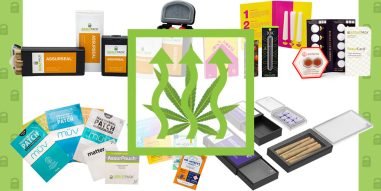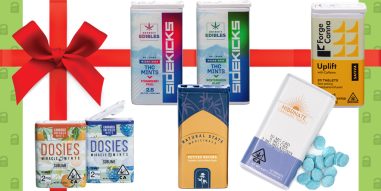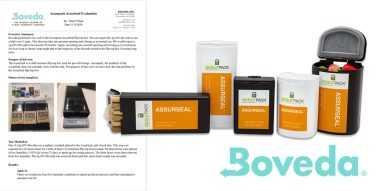Cannabis Counterfeiting: How Better Packaging Can Safeguard Your Business
September 16, 2020
These days, counterfeiting affects more than just designer handbags and Nike t-shirts; cannabis companies are being increasingly targeted. And counterfeiting is more pervasive than most people realize. According to the International Chamber of Commerce, fraudulent product sales are expected to reach $4.2 trillion by 2022.
So, it was only a matter of time before cannabis counterfeiting became widespread. Cannabis presents an ideal opportunity for counterfeiting. Because many cannabis products — such as oil and flower — are nearly indistinguishable at the point of sale, it’s easy to pass off a cheap imitation based on packaging alone.
Even worse, retailers who continue to operate in the “gray market” further the cannabis counterfeiting problem. These unlicensed sellers will gladly stock any product that sells, regardless of its origin. And because regulatory efforts remain patchwork, it’s hard to track or prosecute imitators.
If counterfeiters can easily reproduce your packaging — and if your brand is popular enough to counterfeit — you may find yourself competing with a sub-standard version of your own product. And that’s why distinctive cannabis packaging is so important. It protects your intellectual property from theft while also protecting consumers from adulterated products.
In this post, we take a look at how cannabis packaging can secure your brand against counterfeiters, as well as other actions you can take to protect your reputation and customers.
The Consumer-Facing Dangers of Cannabis Counterfeiting
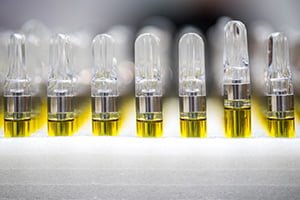 In the era of legal cannabis, consumers have grown to trust well-known brands and licensed retailers. But that doesn’t mean they aren’t cost sensitive. When they see “your product” at a lower price, they can fall prey to fraud — and end up consuming pesticides, heavy metals, and mold byproducts.
In the era of legal cannabis, consumers have grown to trust well-known brands and licensed retailers. But that doesn’t mean they aren’t cost sensitive. When they see “your product” at a lower price, they can fall prey to fraud — and end up consuming pesticides, heavy metals, and mold byproducts.
In 2019, unsuspecting consumers were hit with a wave of lung injuries caused by black market vaporizers. The vape cartridges — which were sold mostly under the brand name “Dank Vapes” — contained vitamin E acetate left behind by poor manufacturing practices.
The Dank Vapes packaging was readily available online, though it didn’t represent a real brand and it wasn’t backed by any one company; many illegal sellers used the Dank Vapes name to legitimize their untested, unregulated oil.
Established brands, like Cookies, suffered from the vape crisis too. Imitation packaging bearing their name made its way from China onto the U.S. market. The Centers for Disease Control flagged Cookies-branded vaporizer cartridges as a danger, and the ensuing confusion damaged the brands standing in the market.
Unfortunately, falling prey to cannabis counterfeiting is all too easy. A simple Google search for “Jungle Boys packaging” or “Platinum Vapes packaging” turns up look-alike boxes of the popular brands, ready to fill with fraudulent products. Packaging, it seems, is the critical factor in these cases of fraud.
How Counterfeiting Packaging Hurts Your Reputation
When counterfeit versions of your product’s packaging are so readily available online, your company suffers for multiple reasons. First, confidence in your brand drops. You’re effectively taking responsibility for the quality of the fraudulent products, and your customers will have a sub-optimal experience of your offering. Their thoughts will find their way onto social media.
Worse still, your company could be subject to a lawsuit based on harm caused by the counterfeiters. You may be able to prove that counterfeit products — rather than your own — caused the damage, but you’ll incur hefty legal expenses in the process.
The worst possible outcome of counterfeiting might be the massive swell of bad publicity for your brand. If a counterfeit product bearing your name causes widespread injuries — such as in the case of the vaporizer crisis — you could be looking at irreparable damage to your company. Media outlets are quick to publicize dangers to public health, and if they warn against your brand, consumers will avoid your products. Confusion about your brand’s legitimacy and safety could extend well beyond the PR incident and into the future.
5 Tips for Protecting Yourself From Cannabis Counterfeiting
#1 Register Your Intellectual Property
Unfortunately, cannabis isn’t allowed the same intellectual property protections as alcohol or other consumer goods. Because it’s federally illegal in the United States, patenting and trademarking cannabis products is tricky, if not impossible.
It’s still worthwhile to pursue IP for your goods, however, on both the state- and federal levels. A few companies have been able to obtain federal trademarks for their logos and wordmarks (that don’t directly pertain to THC-containing goods), and most states with legal cannabis will offer trademark protection too.
For now, state-level trademarks are a cannabis company’s best protection against infringement, and they pave the way for a federal IP application if and when cannabis becomes legalized nationwide. If you’re victim to counterfeiting, IP can help you combat the criminals in court.
#2 Use Distinctive Cannabis Packaging
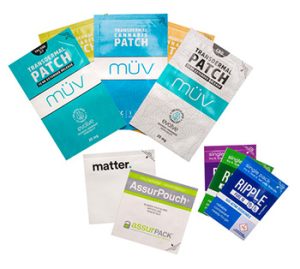 When your cannabis packaging is hard to imitate, your product is hard to counterfeit. At AssurPack®, we offer bespoke packaging solutions that give you an extra layer of protection based on our own patented intellectual property.
When your cannabis packaging is hard to imitate, your product is hard to counterfeit. At AssurPack®, we offer bespoke packaging solutions that give you an extra layer of protection based on our own patented intellectual property.
Our unique designs are not for sale elsewhere on the internet. So, unlike generic packaging (jars, squeeze-top tubes, etc.), AssurPack’s® solutions aren’t available on Alibaba. Our package engineers invent new child-resistant closure mechanisms that your end-users will recognize as being distinctively yours.
#3 Incorporate Covert Packaging Elements
Some anti-counterfeiting features are covert. That means they’re unnoticeable to consumers but easily identified with special equipment. For example, UV-sensitive inks are only visible under a black light — not to the naked eye. And some inks can be identified forensically based on specialized chemical additives.
Covert elements won’t help consumers identify a fraudulent imitation, but they provide other protections. In the case of a regulatory event — like a large seizure of “your” product — they can clear your good name of any wrongdoing. Similarly, if a counterfeit product causes an injury, covert anti-counterfeiting measures can quickly absolve your company from liability.
#4 Consider Unique Serialization and QR Codes
For another level of protection, consider unique serialization with scannable tags. Quick-response codes, better known as QR codes, let customers use their cell phones to verify your product’s authenticity.
A quick scan of the QR code sends them to your website for confirmation of the serial number. Not only does this strategy confirm your product against counterfeiters, it presents an advertising opportunity too. When consumers scan the tag at the retailer’s location, you have a chance to sell them on the product with more information, or let them know your company’s cool backstory.
Some manufacturers go one step further and “gamify” the QR code experience. When customers scan the QR code beneath a scratch-off tag, they get points that they can use toward prizes and product discounts.
#5 Make Sure You Graphic Design is Consistent
Make sure that your products are dressed in well-printed labels. Using multiple colors and high-end inks makes your products more distinctive to your consumers — and imitations of your products more conspicuous.
You’ll also want to standardize your design language (i.e., your colors, logos, and iconography) across all of your products. When all of your products carry the same visual theme, your customers can recognize them more easily and are less likely to be fooled by poorly packaged knockoffs.
What Should You Do If Your Cannabis Brand is Counterfeited?
If you’re subject to fraud, experts agree that it’s essential to take strong action immediately. The damage to your brand is cumulative, and the counterfeit products may put your customers’ health at risk.
Hopefully, you’ve secured your IP to the best of your ability with trademarks at the state and federal levels. Doing so gives you more leverage in court. But, before you litigate, cannabis attorneys recommend a cease-and-desist letter. Suing a counterfeiter can be difficult, especially if your intellectual property isn’t registered.
In the case of fraud, make sure to audit your supply chain too. If you’re working with a vendor in China, there’s little to stop them from selling your packaging to third parties. You’ll need to keep an eye on their activity, and you may need to file for IP protections in China to maintain control of your package design.
Or, you can call AssurPack®. Our patented designs defy imitation. We control our own supply chain — and the molds and tooling equipment for our packaging solutions. With AssurPack®, your product gets a distinctive presentation that’s hard to imitate with packaging from online vendors.
For more information about our patented designs, contact an AssurPack® representative today.


